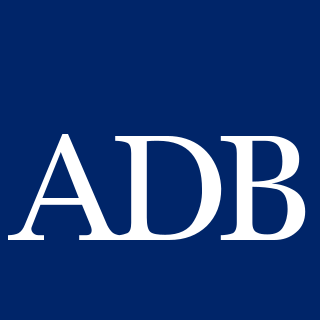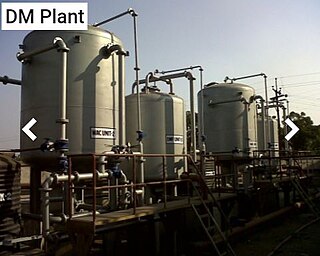Related Research Articles

The Asian Development Bank (ADB) is a regional development bank established on 19 December 1966, which is headquartered in the Ortigas Center located in the city of Mandaluyong, Metro Manila, Philippines. The company also maintains 31 field offices around the world to promote social and economic development in Asia. The bank admits the members of the United Nations Economic and Social Commission for Asia and the Pacific and non-regional developed countries. From 31 members at its establishment, ADB now has 68 members.

The economy of Afghanistan has steadily improved in the last decade due to the return of a large number of wealthy expats, the modernization of the nation's agriculture sector, and the establishment of more trade routes with neighboring and regional countries. The billions of dollars in international assistance that came from expats and outside investors saw this increase when there was more political reliability after NATO became involved in Afghanistan's reconstruction. The nation's GDP (PPP) stands these days at about $70 billion with an exchange rate of $20 billion (2017), and the GDP per capita (PPP) is about $2,000. It imports over $6 billion worth of goods but exports about $1 billion worth of legal products, mainly fruits and nuts.

The European Bank for Reconstruction and Development (EBRD) is an international financial institution founded in 1991. As a multilateral developmental investment bank, the EBRD uses investment as a tool to build market economies. Initially focused on the countries of the former Eastern Bloc it expanded to support development in more than 30 countries from Central Europe to Central Asia. Similar to other multilateral development banks, the EBRD has members from all over the world, with the biggest shareholder being the United States, but only lends regionally in its countries of operations. Headquartered in London, the EBRD is owned by 69 countries and two EU institutions, the 69th being India since July 2018. Despite its public sector shareholders, it invests in private enterprises, together with commercial partners.

Rural electrification is the process of bringing electrical power to rural and remote areas. Rural communities are suffering from colossal market failures as the national grids fall short of their demand for electricity. As of 2017, over 1 billion people worldwide lack household electric power – 14% of the global population. Electrification typically begins in cities and towns and gradually extends to rural areas, however, this process often runs into obstacles in developing nations. Expanding the national grid is expensive and countries consistently lack the capital to grow their current infrastructure. Additionally, amortizing capital costs to reduce the unit cost of each hook-up is harder to do in lightly populated areas. If countries are able to overcome these obstacles and reach nationwide electrification, rural communities will be able to reap considerable amounts of economic and social development.
Energy poverty is lack of access to modern energy services. It refers to the situation of large numbers of people in developing countries and some people in developed countries whose well-being is negatively affected by very low consumption of energy, use of dirty or polluting fuels, and excessive time spent collecting fuel to meet basic needs. It is inversely related to access to modern energy services, although improving access is only one factor in efforts to reduce energy poverty. Energy poverty is distinct from fuel poverty, which focuses solely on the issue of affordability.

Kazakhstan owns large reserves of energy resources, and therefore the energy policy of Kazakhstan has influence over the world's overall energy supply. Although Kazakhstan has not described itself as an energy superpower, Kazakhstan's former president Nursultan Nazarbayev has claimed Kazakhstan will become a factor of energy security in Asia and Europe. Kazakhstan has a strategic geographical location to control oil and gas flows from Central Asia to East (China) and West.
For solar power, South Asia has the ideal combination of both high solar insolation and a high density of potential customers.

The water supply and sanitation in India has improved greatly from 1980 to present. However, many people lack access to clean water, toilets, and sewage infrastructure. Various government programs at national, state, and community level have brought rapid improvements in sanitation and the drinking water supply. Some of these programs are ongoing.
Drinking water supply and sanitation in Pakistan is characterized by some achievements and many challenges. Despite high population growth the country has increased the share of the population with access to an improved water source from 85% in 1990 to 92% in 2010, although this does not necessarily mean that the water from these sources is safe to drink. The share with access to improved sanitation increased from 27% to 48% during the same period, according to the Joint Monitoring Program for Water Supply and Sanitation. There has also been considerable innovation at the grass-root level, in particular concerning sanitation. The Orangi Pilot Project in Karachi and community-led total sanitation in rural areas are two examples of such innovation.
Water supply and sanitation in Iran has witnessed some important improvements, especially in terms of increased access to urban water supply, while important challenges remain, particularly concerning sanitation and service provision in rural areas. Institutionally, the Ministry of Energy is in charge of policy and provincial companies are in charge of service provision.
Energy in Azerbaijan describes energy and electricity production, consumption and export in Azerbaijan.

The energy policy of Pakistan is formulated and determined by the federal, provincial, and local institutional entities in Pakistan, which address the issues of energy production, distribution, and consumption of energy, such as gas mileage and petroleum standards. Energy policy requires the proper legislation, international treaties, subsidies and incentives to investment, guidelines for energy conservation, taxation and other public policy techniques.
The Hazaras have long been the subjects of persecution by both states and non-state militant groups. The Hazaras are mostly from Afghanistan, primarily from the central regions of Afghanistan, known as Hazarajat. Significant communities of Hazara people also live in Quetta, Pakistan, and in the city of Mashad, Iran, as part of the Hazara and Afghan diasporas.

Renewable energy in Afghanistan includes biomass, hydropower, solar, and wind power. Afghanistan is a landlocked country surrounded by five other countries. With a population of less than 35 million people, it is one of the lowest energy consuming countries in relation to a global standing. It holds a spot as one of the countries with a smaller ecological footprint. Hydropower is currently the main source of renewable energy due to Afghanistan's geographical location. Its large mountainous environment facilitates the siting of hydroelectric dams and other facets of hydro energy.
China–Pakistan Economic Corridor (CPEC) is a collection of infrastructure projects that are under construction throughout Pakistan since 2013. Originally valued at $47 billion, the value of CPEC projects is worth $62 billion as of 2020 with no current completion date. CPEC is intended to rapidly upgrade Pakistan's required infrastructure and strengthen its economy by the construction of modern transportation networks, numerous energy projects, and special economic zones. On 13 November 2016, CPEC became partly operational when Chinese cargo was transported overland to Gwadar Port for onward maritime shipment to Africa and West Asia, while some major power projects were commissioned by late 2017.

The World Bank is an international financial institution that provides loans and grants to the governments of low- and middle-income countries for the purpose of pursuing capital projects. It comprises two institutions: the International Bank for Reconstruction and Development (IBRD), and the International Development Association (IDA). The World Bank is a component of the World Bank Group.
Water supply and sanitation in Georgia is characterized by achievements and challenges. Among the achievements is the improvement of water services in the capital Tbilisi where the water supply is now continuous and of good quality, major improvements in the country's third-largest city Batumi on the Black Sea where the country's first modern wastewater treatment plant now is under operation, as well as a general increase in access to drinking water in the entire country. Water and sewer tariffs remain affordable, with the private water company Georgian Water and Power (GWP) serving the capital being financially viable and profitable, while the public water company serving most of the rest of the country remains financially weak. The improvements were achieved after the Rose Revolution of 2004 when the government decided to reform the sector and to invest in it after many years of neglect.

On 23 July 2016, a twin bombing occurred in the vicinity of Deh Mazang square in Kabul, capital of Afghanistan, when #Enlightenment_Movement protesters, mostly from the Hazara ethnic minority, were marching against a decision to bypass their region in the development of the TUTAP mega power project. At least 97 people were killed and 260 injured. The terrorist group Islamic State of Iraq and the Levant claimed responsibility, however the same group later on refused it. Some Hazara protestors allege that Afghan president Ashraf Ghani was behind the attack. They believe that Ashraf Ghani government was abetting the terrorists who were responsible for the attack. They also allege that the government officials were preventing the wounded from being shifted to the hospital.

Azerishiq is the Baku electrical grid operator.
The Enlightenment Movement is a grassroots civil disobedience movement of Hazaras created in 2016 in Afghanistan in response to the Afghan government's change in routing plans for proposed international electricity networking, which was perceived as continuing historical anti-Hazara discrimination. The group organised major protests in Afghanistan and internationally during 2016 and 2017, protesting against discrimination. The group's youthful leadership challenged traditional Hazara leaders for representativity of the community.
References
- 1 2 "What's behind Afghan power project protests?", BBC Monitoring, 2016-05-16, accessed 2016-07-24
- ↑ "TUTAP Energy Project Sparks Political Infighting in Afghanistan", The Diplomat, 2016-05-10, accessed 2016-07-24
- ↑ "Afghanistan: Energy Supply Improvement Investment Program (Formerly Multitranche Financing Facility II: Energy Development 2014-2023)", Asian Development Bank , accessed 2016-07-24
- ↑ 'Isis claims responsibility for Kabul bomb attack on Hazara protesters', "The Guardian", 2016-7-24, accessed 2016-7-24